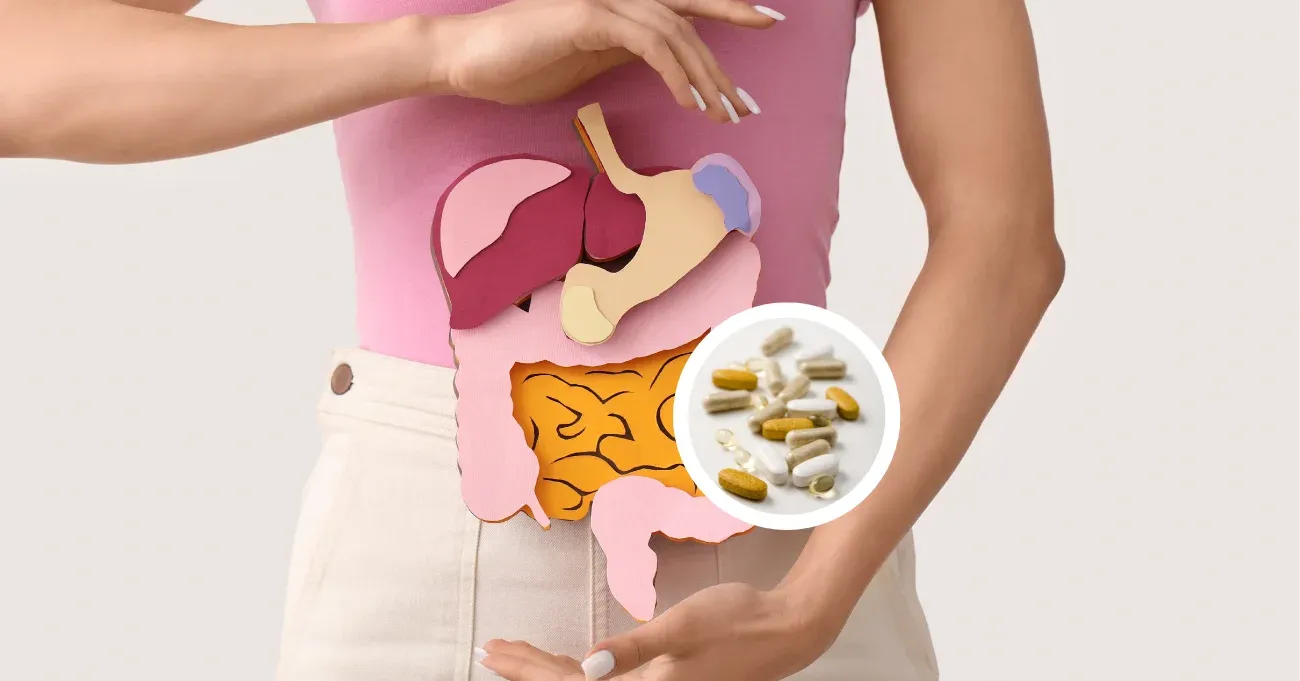
Vitamins for digestion are increasingly in higher demand since more people try to manage their weight and do so in a way that optimizes gut health. In today's world, where people have become more knowledgeable about gut health and its relationship with overall health, it is best to learn how specific vitamins can promote digestion and metabolism.
At Nudge, we offer detailed insights into the benefits of vitamins for digestion, empowering you to make informed choices about your digestive health. Our expertise extends to formulating various health supplements designed to address various digestive issues, ensuring optimal support for your digestive function and overall well-being.
In this post, based on extensive scientific research, we will look at the vitamins for digestion and their possible impact on weight loss. More importantly, we will discuss which vitamins help with digestion by explaining their mechanisms of action and providing tips on how to include them in your daily routine easily. Until the end, you'll have a broad understanding of how vitamins for digestion can support you on your weight loss journey towards a healthy lifestyle.
Let's get started!
Understanding the Connection Between Vitamins for Digestion and Weight Loss
Effective digestion is essential for metabolism and nutrient absorption, which are critical for weight management. Probiotics and vitamins for digestion aid food breakdown and nurture a healthy gut microbiome, positively impacting metabolism and hunger regulation. A well-supported digestive system can enhance fat storage control and reduce cravings.
How Digestive Efficiency Affects Metabolism
A well-functioning digestive system is of great importance to the general metabolic process of the body and directly influences the form in which nutrients are metabolized. At the same time, when digestion goes fine, it allows better absorption of vital nutrients, thus giving the organism energy for daily activities. Check out its functions to enhance overall health and support weight management goals:
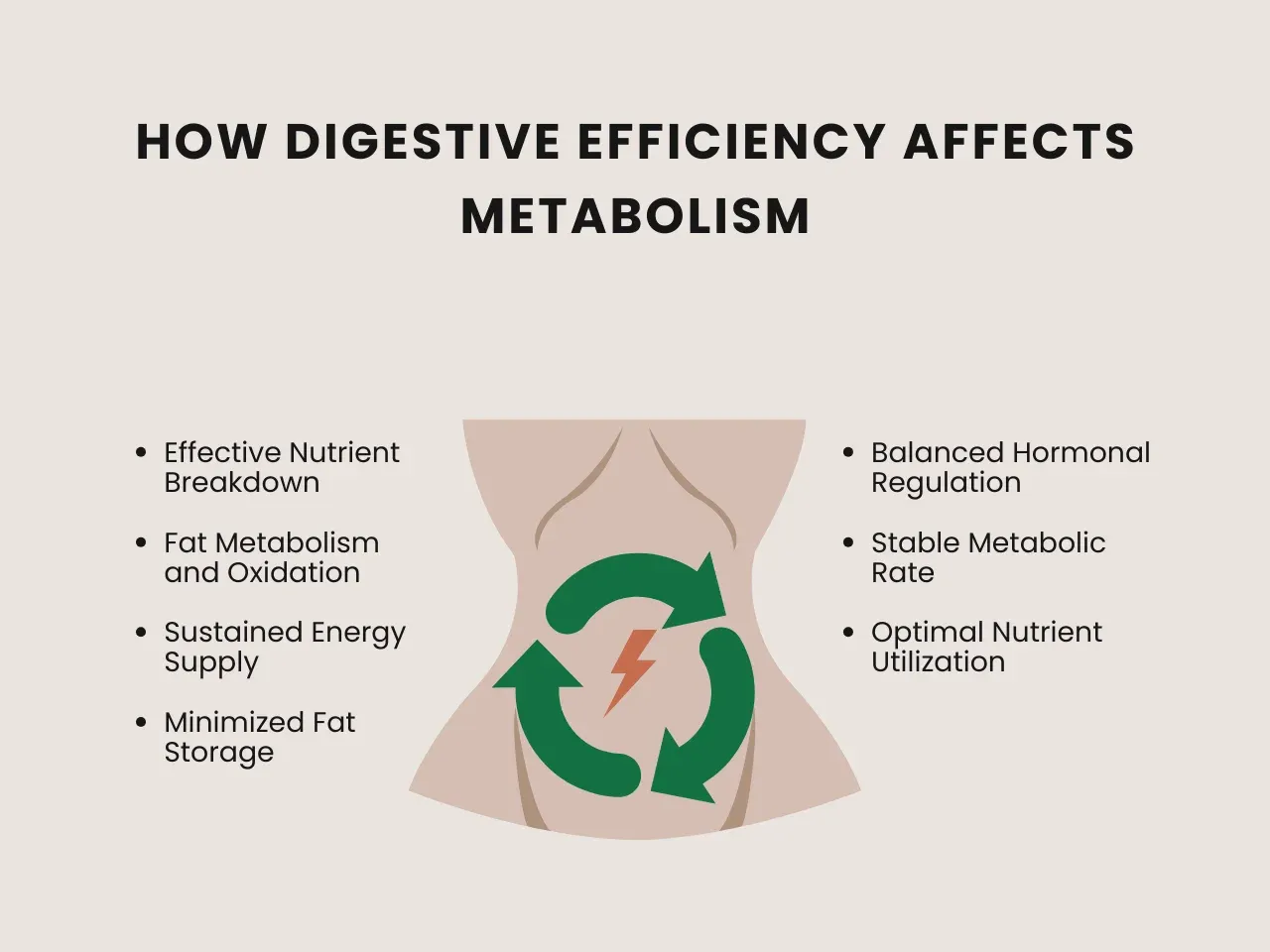
- Effective Nutrient Breakdown: Digestive enzymes include protease, lipase, and amylase, which break down proteins, fats, and carbohydrates into smaller units that may easily be absorbed.
- Fat Metabolism and Oxidation: Digestive efficiency enables better fat processing, especially with the help of green tea extract, which can boost fat oxidation and contribute to body fat reduction.
- Sustained Energy Supply: Efficient digestion does not let energy dips occur because it allows for a continuous supply of glucose and other forms in the body. This helps constantly supply energy within the body, reducing fatigue and maintaining physical activeness.
- Minimized Fat Storage: When the body efficiently utilizes food calories, there is less chance that excess energy will be stored in the form of fats. Good digestion supports sound metabolic processing, which helps weight management due to the lack of unwanted fat accumulation.
- Balanced Hormonal Regulation: Digestion could also affect the balance of hormones in appetite and satiety. Indeed, when nutrients are digested well, the body can regulate appetite, reducing cravings or overeating tendencies.
- Stable Metabolic Rate: With proper digestion, the metabolic rate does not experience extreme highs and lows associated with spiky nutrient absorption. Stability in metabolic rate supports consistent energy levels and weights.
- Optimal Nutrient Utilization: When nutrients are digested well, they can be precisely used in the body for different functions, like building muscle, immunity, and energy. This process minimizes the chances that the calories from food may get deposited in the form of unwanted fat.
Reducing Bloating and Water Retention
Bloated water retention badly affects our feelings and appearance, often bringing unpleasantness in body sensations. That's why it is so relevant to take care of those-not just for aesthetic maintenance but especially for the health of the digestive tract. Explore how digestive enzymes can improve your quality of life by making digestion work more smoothly:
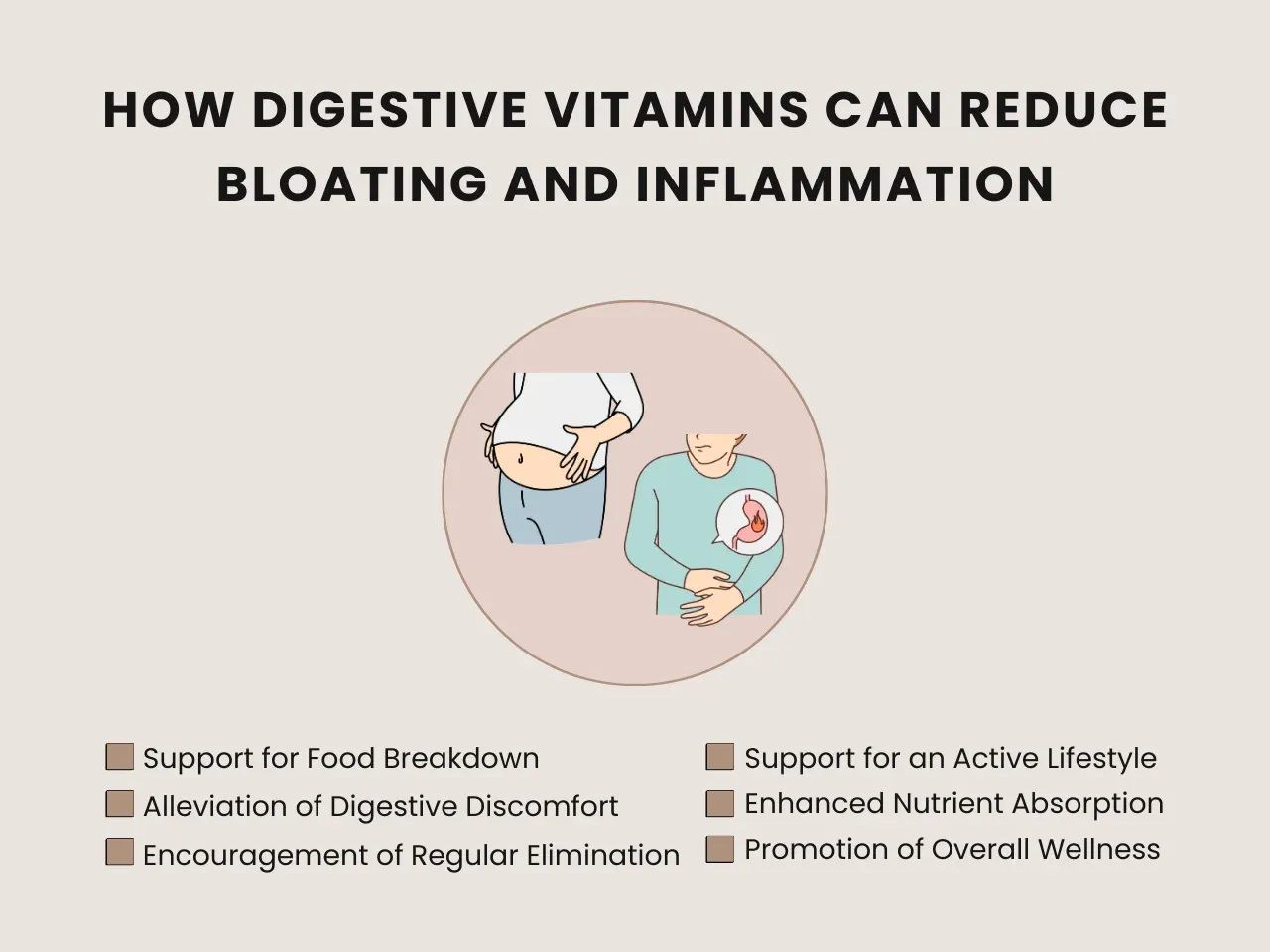
- Support for Food Breakdown: Digestive supplements, primarily enzymes, enhance digestion by breaking down food components. Enzymes like lactase, cellulase, and alpha-galactosidase target specific difficult-to-digest substances, reducing discomfort.
- Alleviation of Digestive Discomfort: These enzymes alleviate bloating, ensuring proper digestion and preventing food fermentation in the gut. Reduced bloating leads to less discomfort and a more relaxed and at-ease feeling.
- Encouragement of Regular Elimination: These supplements encourage digestive efficiency, helping the body regulate bowel movements and ensure that waste material and toxins are flushed out.
- Support for an Active Lifestyle: By reducing bloating and water retention, one is bound to feel increased energy, motivating them to be more active. Again, this can indirectly lead to weight loss by burning calories and getting into better shape.
- Enhanced Nutrient Absorption: Digestive health increases vitamin and mineral absorption, such as Vitamin C, which supports metabolic health and immunity. This might mean increased energy levels, making the person more capable of undertaking physical activities.
- Promotion of Overall Wellness: Digestive comfort is associated with a feeling of wellness, which is imperative in sustainable weight management. If one feels good inside his body, he will make better choices that promote weight loss and assess his weight management goals.
Improving Gut Health to Support Weight Loss
Gut health is vital for managing hunger, cravings, and weight control. A balanced microbiome, with diverse beneficial bacteria, influences hormones that regulate hunger and satiety. Gut bacteria regulate hormones like ghrelin, which stimulates appetite, and leptin, which signals fullness. Discover how improving gut health can support weight management and overall well-being:
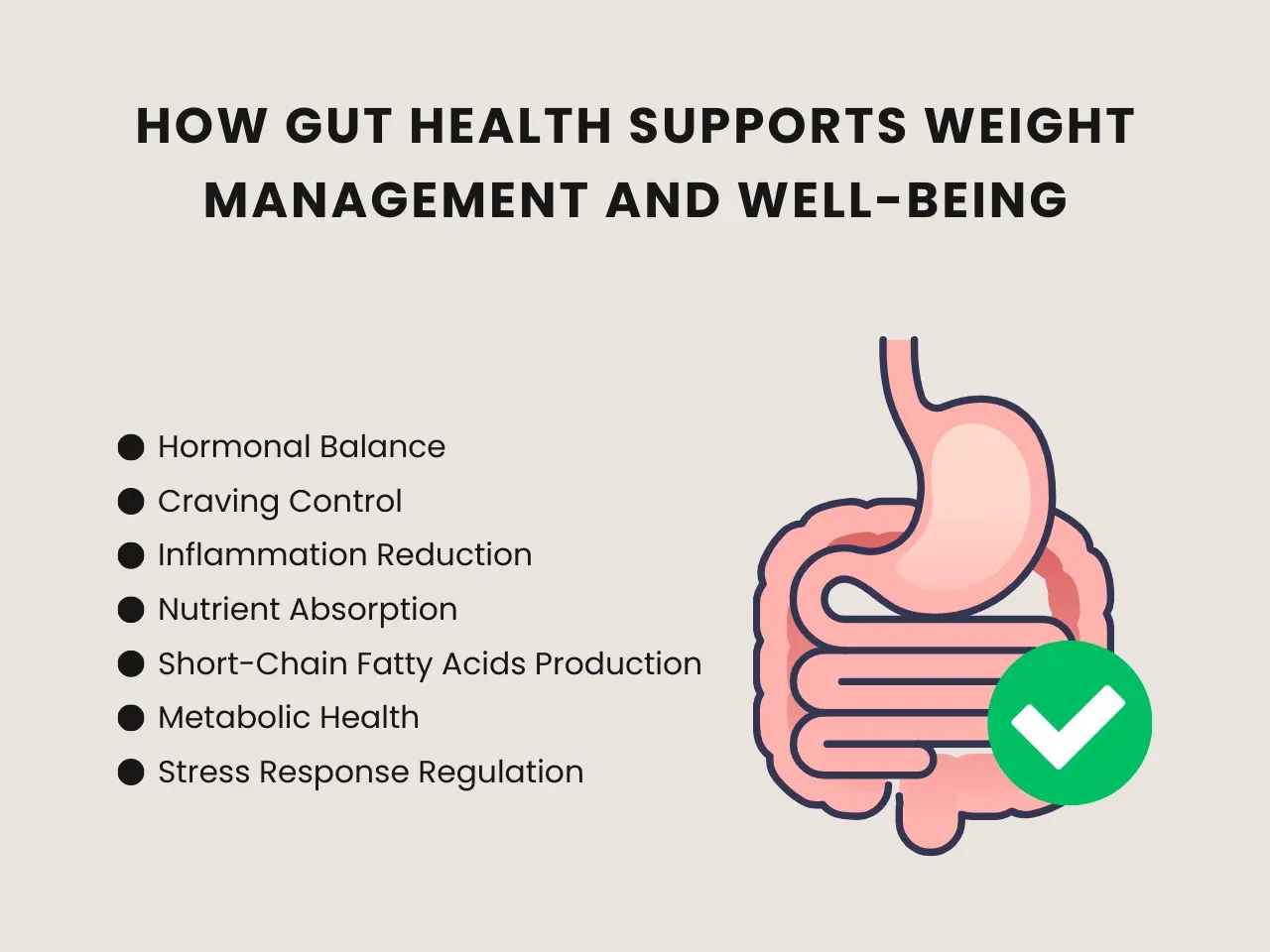
- Hormonal Balance: A balanced microbiome regulates the hunger hormones ghrelin and leptin. When good bacteria thrive in the gut, they may have favorable effects on both the secretion and sensitivity of these hunger hormones, promoting feelings of satiety and reducing excessive hunger.
- Craving Control: The gut microbiome influences the brain's reward pathways, affecting a person's cravings for specific food items. A healthy intestinal balance of bacteria decreases cravings for sugary and high-fat foods, making the selection and intake of more nutritious choices supporting weight management.
- Inflammation Reduction: A balanced microbiome has the potential to reduce body inflammation, which has contributed to weight gain and metabolic problems. With reduced inflammation, individuals may have fewer cravings and better appetite regulation.
- Nutrient Absorption: A healthy gut microbiome improves nutrient uptake, ensuring the body gets what it needs to function correctly. Whole grains and fiber promote beneficial gut bacteria, enhancing nutrient absorption.
- Short-Chain Fatty Acids (SCFAs) Production: Gut-friendly bacteria produce short-chain fatty acids by fermenting fiber, which controls appetite. SCFAs have been described as increasing satiety and reducing appetite, thus facilitating weight management.
- Metabolic Health: A well-rounded, balanced microbiome generally leads to good metabolism and may affect how energy is utilized and processed by the body. Improved metabolism may result in weight success and reduced cravings.
- Stress Response Regulation: Proper gut health is linked to the body's response to stress, which interferes with eating behavior. A well-balanced microbiome could reduce cravings brought on by stress, enabling more informed dietary choices.
Key Vitamins and Nutrients for Digestive Health and Their Role in Weight Loss
Vitamins for digestion promote healthy digestion by supplying the essential nutrients needed to maintain a healthy weight. Nutrients like probiotics, B vitamins, vitamin D, and fiber are significant in digestion and regulating metabolism, appetite, and fat storage. Incorporating these critical components into a healthy diet enhances digestion and nutrient absorption, providing stable energy levels for effective weight management.
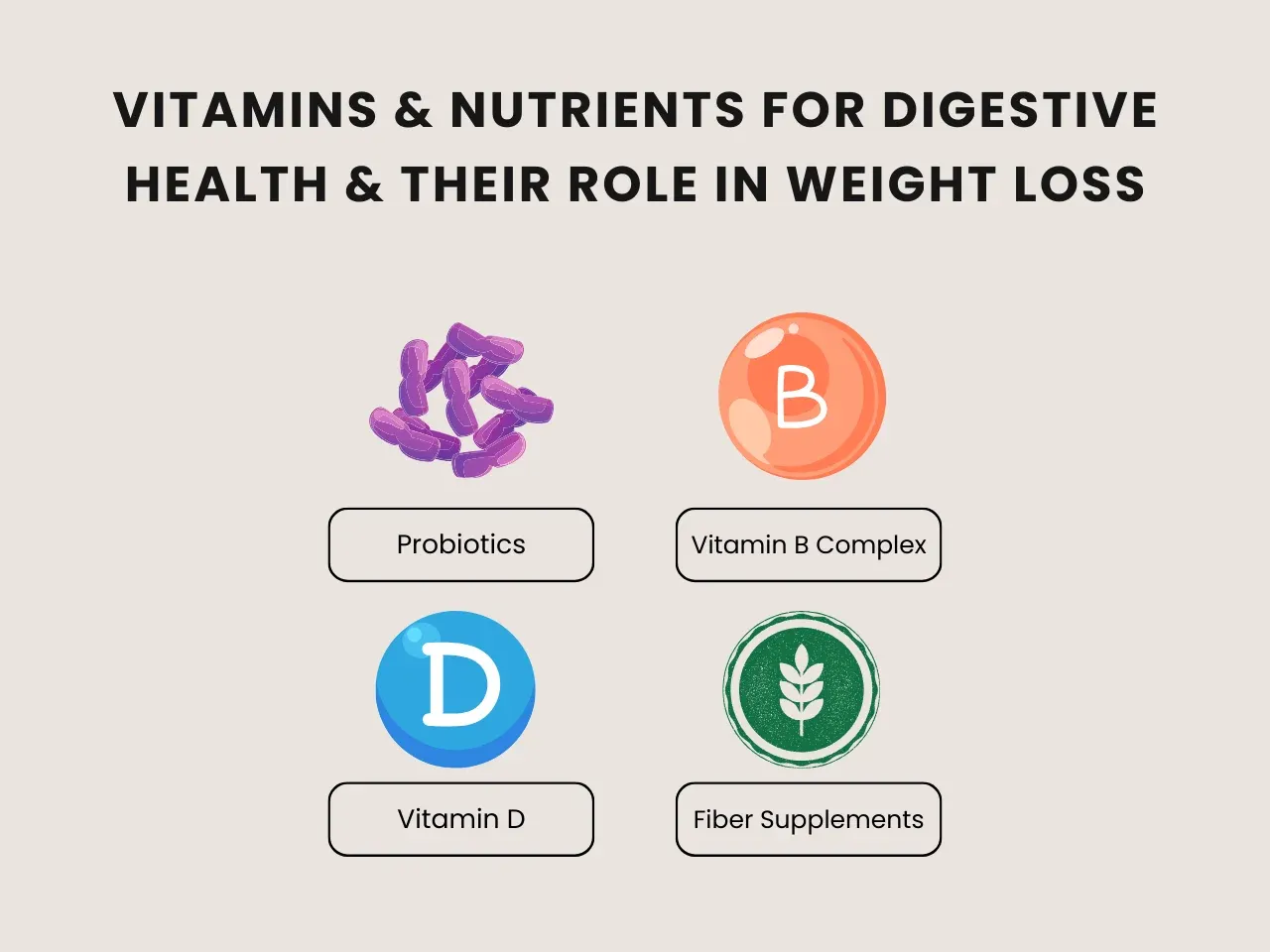
Probiotics
Probiotics introduce good bacteria into the gut, enhancing the balance of gut flora for smoother digestion. Thus, they help one's body inundate food much more quickly and reduce bloating. The regularity that results improves metabolic function. Additionally, a well-balanced gut microbiome is believed to boost metabolism positively, helping to manage body weight and prevent excess fat storage.
Clinical trials show that specific probiotic strains, such as Lactobacillus gasseri, can support weight loss by reducing abdominal fat and body mass index (BMI). For example, strains, such as Lactobacillus gasseri, exist and help reduce abdomen fat and body mass index. Continuous study of probiotic vitamins unravels how they maintain blood sugar levels and reduce cravings, enabling a healthier approach toward weight management.
Vitamin B Complex
The digestion process is one of the most crucial roles B vitamins play through supporting the production and function of digestive enzymes needed for adequate carbohydrate, protein, and fat digestion. Energy from food is made possible by vitamins B6, B12, and B3 through increased metabolism and utilization of nutrients within the body.
Individual functions include Vitamin B6, which is very active in the metabolic process of proteins; Vitamin B12, which helps the body produce red blood cells within the system; and Vitamin B3, which aids the release of energy from carbohydrates. These vitamins for digestion decrease fatigue and overeating, promote a smooth metabolic rate and ultimately contribute to weight loss.
Vitamin D
Vitamin D is essential for gut health. It modulates the immune system and maintains the balance of bacteria along the digestive tract. Vitamin D can minimize fat storage and enhance metabolic rate, thus making it easier to manage weight. Accordingly, this vitamin helps produce antimicrobial proteins, keeping the gut lining healthy and safer from harmful bacteria; digestion and absorption improve.
Vitamin D regulates hormones that control appetite and can suppress hunger. Research has documented that proper vitamin D levels keep the hormone signaling fullness, called leptin, within range, reducing the possibility of overeating. A vitamin D supplement can support digestion, metabolic health, and weight management for those with a vitamin D deficiency.
Fiber Supplements
Fiber is very much noted for its pivotal role in normalizing bowel movement, preventing and reducing bloating, and enhancing digestive efficiency with the easy passage of food through the digestive tract. It absorbs water, adds bulk to the stool, and prevents constipation, hence easier digestion. Fiber promotes regularity, eliminating toxins that reduce bloating and make it easier to develop a lean appearance.
In addition to being a digestive substance, fiber has been known to be skeptical concerning weight management in that it produces a satiety lasting longer than the other macronutrients, thereby reducing afternoon and between-meals snacking. By helping people feel full for relatively long periods, fiber may help with calorie control, thereby supporting weight management indirectly.
Benefits and Limitations of Digestive Vitamins for Weight Loss
Vitamins for digestion can play a significant role in weight loss by improving nutrient absorption, supporting digestive health, and providing various health benefits. While they do offer a lot, temper your expectations. Consider these pros and cons so you can make an informed choice:
Benefits of Digestive Vitamins for Weight Loss
These vitamins for digestion can accelerate the pace of losing weight, as they enhance both the processing and usage of nutrients. They ensure a continued foundation of energy and overall well-being by giving a healthier vibe to the digestive environment. Here are some ways they support weight loss efforts:
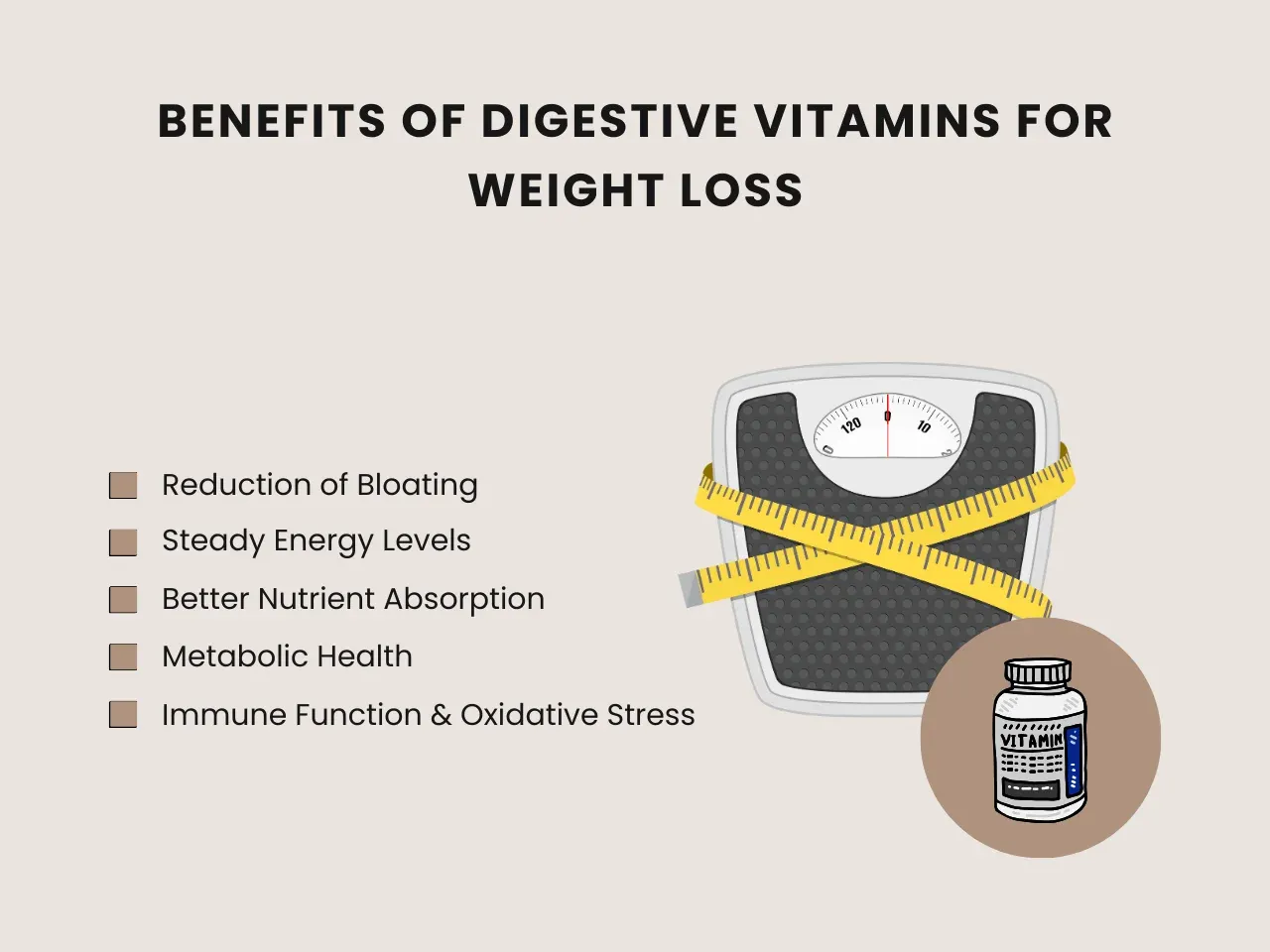
- Reduction of Bloating: These vitamins for weight loss can reduce bloating and discomfort, presenting a leaner appearance.
- Steady Energy Levels: These vitamins contribute to consistent energy levels, support an active lifestyle, and potentially increase energy expenditure.
- Better Nutrient Absorption: Vitamin supplements in a digestive complex help the body absorb essential vitamins and nutrients, maximizing energy derived from food and supporting healthy metabolism. Dairy products, leafy greens, and apple cider vinegar can further support digestion.
- Metabolic Health: Vitamins for weight loss support metabolic health, essential to maintaining a healthy weight. Specific vitamins may improve insulin sensitivity, aid blood sugar control, and fat burning, and positively influence cholesterol levels and high blood pressure.
- Immune Function and Oxidative Stress: Vitamins like D and B-complex support immune function and may help reduce oxidative stress, particularly when paired with foods high in omega-3s, such as fatty fish.
Limitations of Digestive Vitamins for Weight Loss
While vitamins for digestion may help lose weight, they do not work as magic bullets. Understanding the limitations of digestive vitamins will set your expectations right to achieve realistic and enduring results. Let's go over some of these limitations to improve your weight loss strategy and make an informed decision on how to include digestive vitamins into your routine:
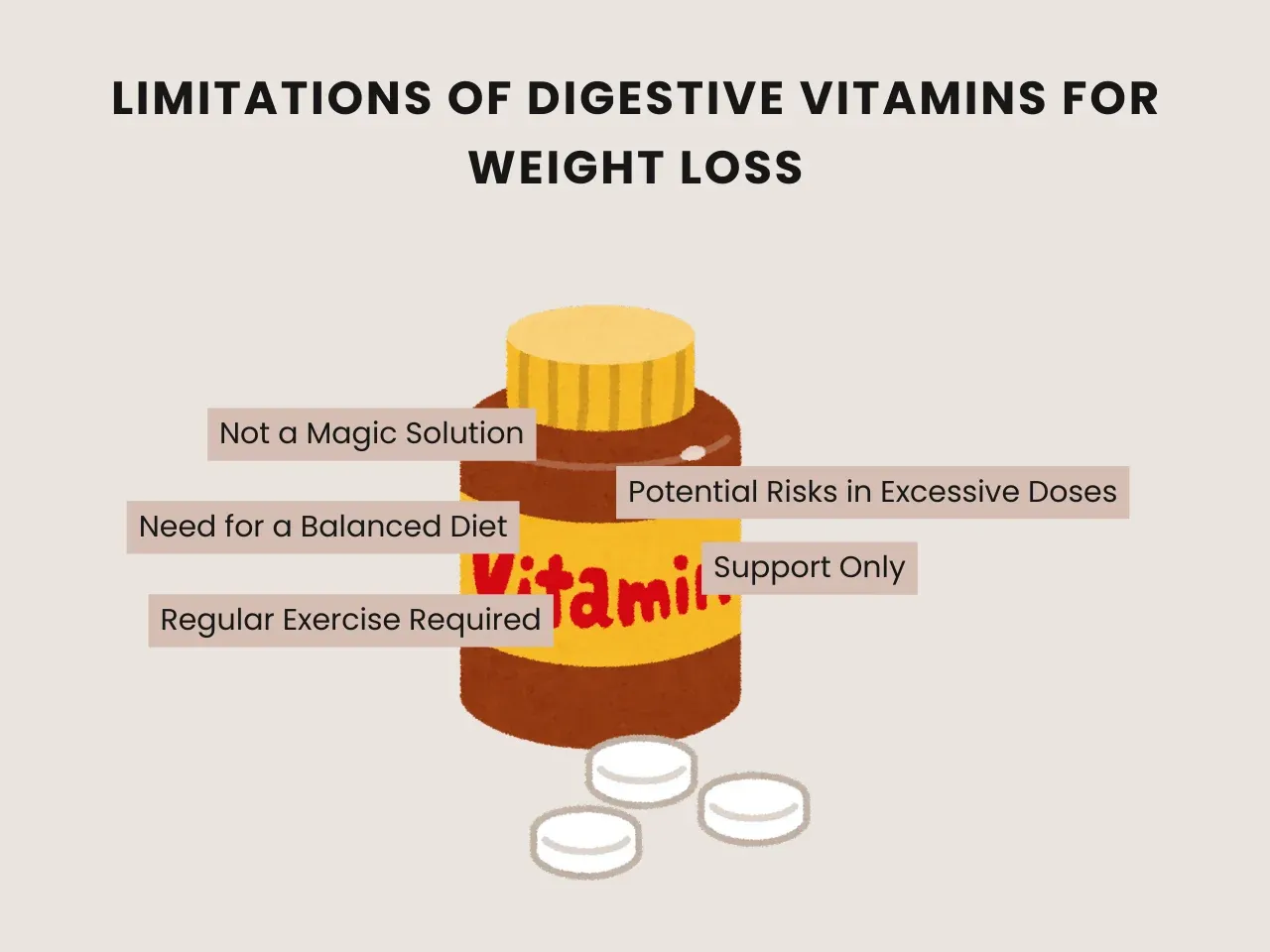
- Not a Magic Solution: Digestive vitamins are not intended as a primary tool for significant weight loss; they should work in conjunction with other health habits.
- Need for a Balanced Diet: Effective weight management requires a good diet balance; dependence on vitamins may evoke a limited outcome.
- Regular Exercise Required: Combining vitamins for digestion with sufficient exercise is crucial in achieving and sustaining a weight loss goal.
- Potential Risks in Excessive Doses: Overusing specific vitamins, particularly in high doses, can lead to health risks such as liver damage. Use supplements within recommended limits to minimize these risks, and consult a healthcare professional for advice.
- Support Only: Studies have indicated that while some vitamins may help prevent heart disease, weight management requires multiple strategies, including dietary adjustments, exercise, and a vitamin D supplement to counter deficiencies.
Key Takeaway
Consulting a healthcare professional will ensure that vitamins for digestion align with individual health goals and needs associated with, for instance, weight management and fat loss. A professional can advise on compliance with personal health conditions and ways of life, giving one the maximum benefits of supplementation.
The focus is on quality and bioavailability in the selection of digestive vitamins. Ensure you go for active dosing by reputable brands with quality, clinically researched ingredients for better performance in enhancing the vitamins for overall digestive health and further weight management.
Not sure which digestive vitamins are right for you and your weight loss? Nudge offers specialized SIBO supplements to enhance digestion, particularly for digestive challenges like SIBO and IBS. We can provide the exact guidance needed to find the right vitamins to support weight loss and overall health.